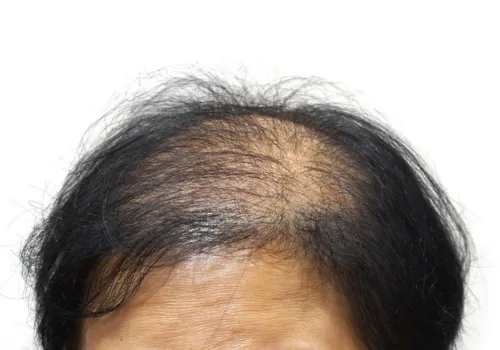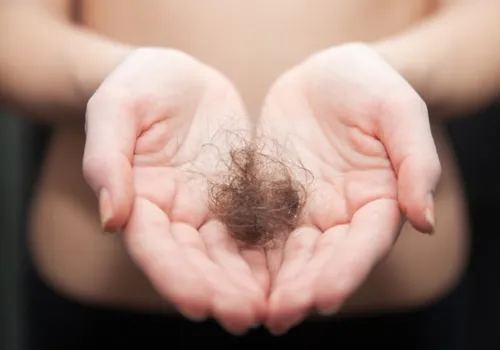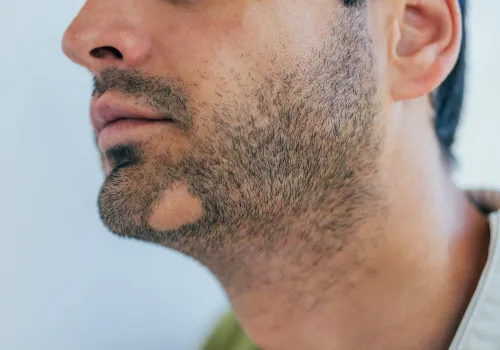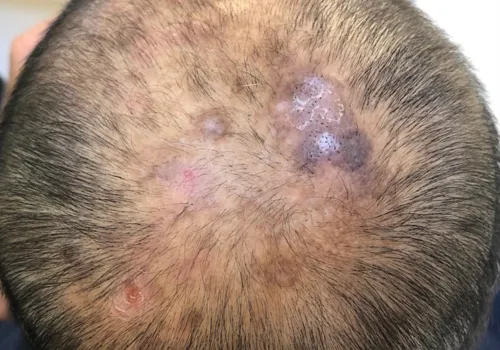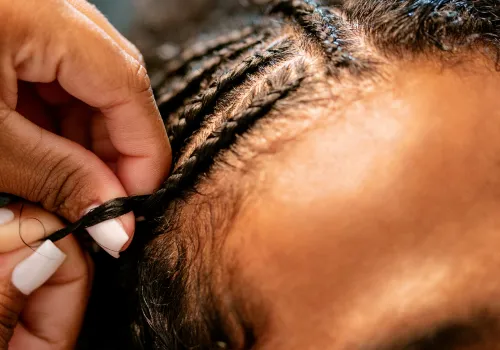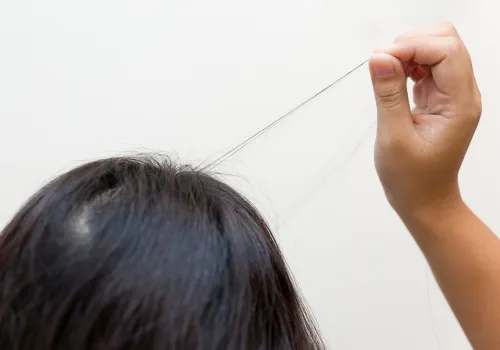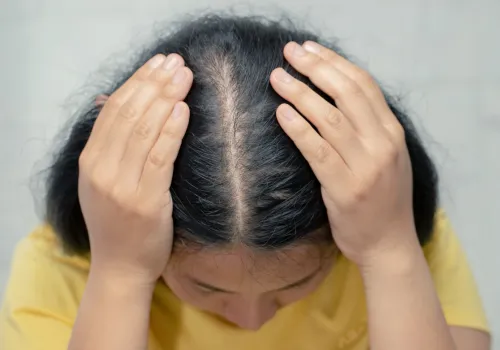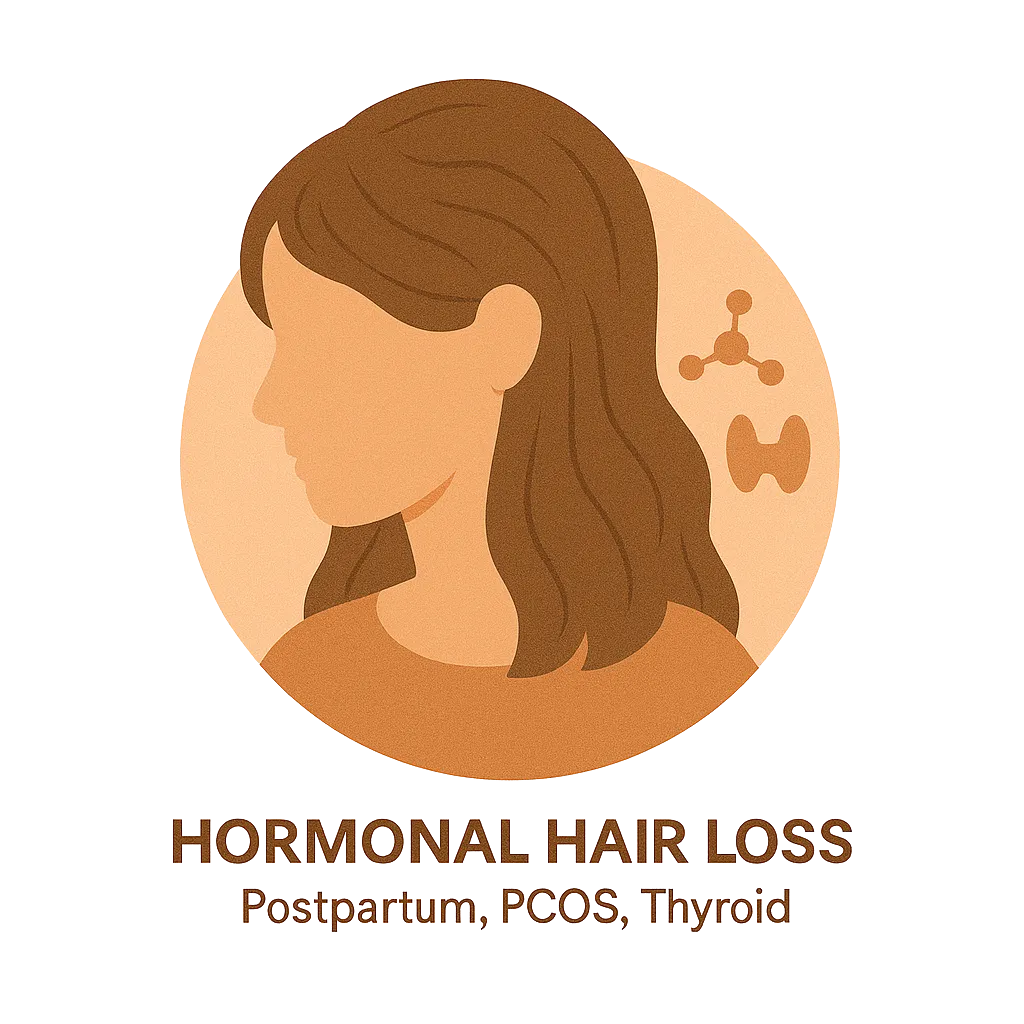
Hormonal Hair Loss
(Postpartum, PCOS, Thyroid)
Fluctuations in hormones—such as after childbirth, with PCOS, menopause, or thyroid imbalances—can disrupt the hair growth cycle, causing thinning or shedding. This type often overlaps with other forms of hair loss.
Scroll to Learn More
Hair loss driven by imbalanced hormone levels, commonly linked to life stages like postpartum, perimenopause, PCOS, or thyroid disorders.
What is Hormonal Hair Loss?
Hormonal hair loss refers to hair thinning or shedding caused by shifts or imbalances in key hormones that regulate the hair growth cycle. Unlike genetic hair loss, this type is often triggered by life transitions—such as pregnancy, menopause, or discontinuing birth control—or by underlying endocrine disorders like PCOS or thyroid dysfunction.
The hormonal changes can shorten the hair’s growth phase (anagen) and push more follicles into the resting phase (telogen), leading to excessive shedding, reduced density, or hairline changes. Once the underlying hormonal imbalance is corrected, regrowth is often possible.
Common Causes & Contributing Factors
Postpartum shifts – Sudden estrogen drop after childbirth (postpartum TE)
Perimenopause & menopause – Decline in estrogen and progesterone
PCOS – Elevated androgens and insulin resistance
Hypothyroidism or hyperthyroidism – Alters hair growth rhythm
Birth control – Starting, stopping, or changing hormonal contraception
Chronic stress – Impacts cortisol and DHEA levels
Blood sugar dysregulation – Affects insulin and adrenal hormones
Don't worry, we can help!
What You Might Notice
Gradual thinning along the part line or crown
Shedding clumps in shower or brush
Widening part or loss of volume in ponytail
Oily scalp or acne (especially with androgen excess)
Mood swings, fatigue, weight gain, irregular periods (if linked to hormones)
May overlap with Androgenetic Alopecia or Telogen Effluvium
Professional Support & Diagnosis
How It’s Diagnosed:
Assessment usually includes:
Symptom timeline (e.g., postpartum, new birth control, menstrual changes)
Functional blood analysis: estrogen, progesterone, testosterone, DHEA, thyroid panel, insulin, vitamin D, ferritin
Scalp exam for signs of miniaturization, inflammation, or shedding
Gut-liver axis testing (since hormone metabolism is heavily dependent on detox pathways)
Hormone cycle tracking or salivary hormone testing if needed
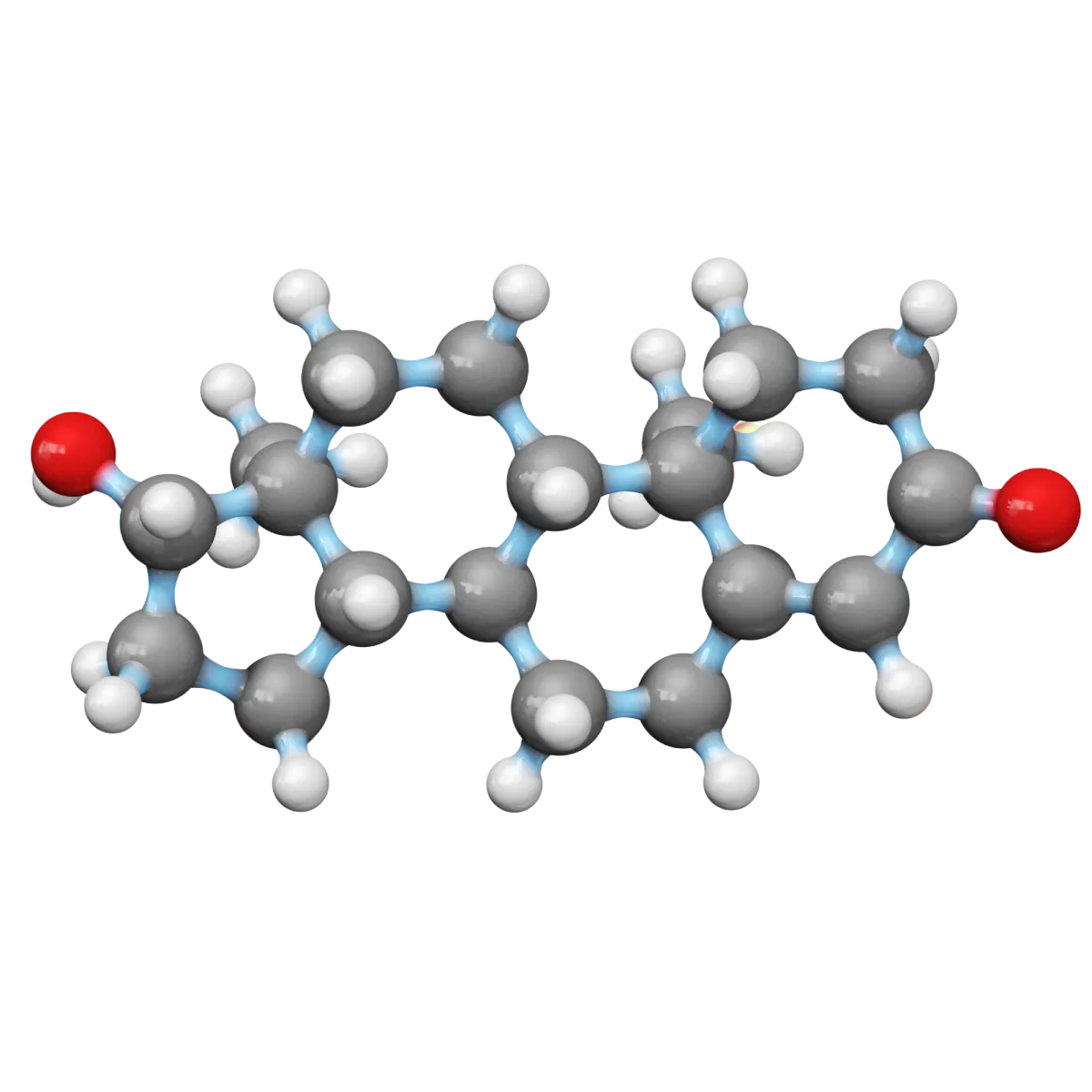
Treatment & Management Options
What Can Be Done
Lifestyle Recommendations
Support hormone balance with sleep, blood sugar regulation, and exercise
Include cruciferous vegetables and flaxseeds to promote estrogen metabolism
Avoid xenoestrogens in plastics, synthetic fragrances, and conventional meat
Topical / Clinical Treatments
Scalp therapies with rosemary, peppermint, or pumpkin seed extract (mild DHT blockers)
Red light therapy for hormone-sensitive follicles
Microneedling for reactivation of dormant follicles (post-shedding phase)
Scalp Therapies & Supplements
Adaptogens (ashwagandha, rhodiola) for stress hormone balance
DIM, vitamin B6, and calcium-D-glucarate for estrogen detox support
Zinc, biotin, omega-3s, and vitamin D for follicle health
Tailored for hormone regulation + hair growth support


Not ready to book a session just yet?
That’s okay—your curiosity still matters! If you have a question about hair or scalp health but aren’t ready to move forward with a consultation, feel free to send it our way. We may feature it in an upcoming blog post or use it as a topic in a future live session—because chances are, someone else is wondering the same thing too.
Hormonal Hair Loss Blog
We regularly share content on this topic through both video and written posts. Use the search bar to find answers to the specific questions you're looking for.
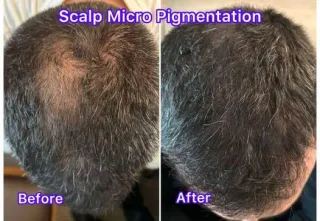
Scalp Micropigmentation (SMP)
Scalp Micropigmentation (SMP) ...more
Androgenetic Alopecia ,Bissan
May 22, 2025•5 min read

General Hair Loss Treatments
General Hair Loss Treatments ...more
Trichology ,kerrijarrett
May 22, 2025•1 min read
"After stopping birth control, I started losing so much hair it scared me. It took a full hormone panel and a few months of support, but I finally found a rhythm. My hair is coming back, and I feel more balanced overall."
– Client, Age 32
Real Stories. Real Experiences.
You’re Not Alone with Nutritional Hair Loss
Hormonal Hair Loss is complex — but you're not crazy, and you're not alone.
This space is here to hold the truth, the science, and the stories. Together, we make sense of what’s happening beneath the surface and reclaim what’s ours.
Want to Learn more on Hormonal Hair Loss
We’ve curated a powerful playlist just for you — packed with expert insights, real stories, and top videos to help you understand the hormonal shifts behind hair loss. Whether you’re navigating perimenopause, PCOS, postpartum, or thyroid changes — knowledge is your greatest ally.
Join our YouTube community and explore trusted content to guide your journey back to balance.
CLICK BELOW TO WATCH FIRST!
Are You a Hair & Scalp Professional? Join the Faculty of Trichology
Whether you're already an expert, just getting started, or looking to deepen your specialty—we’ve got something for you.
The Faculty of Trichology is where professionals come to elevate their skills, build their credibility, and connect with a network that takes hair and scalp health seriously.
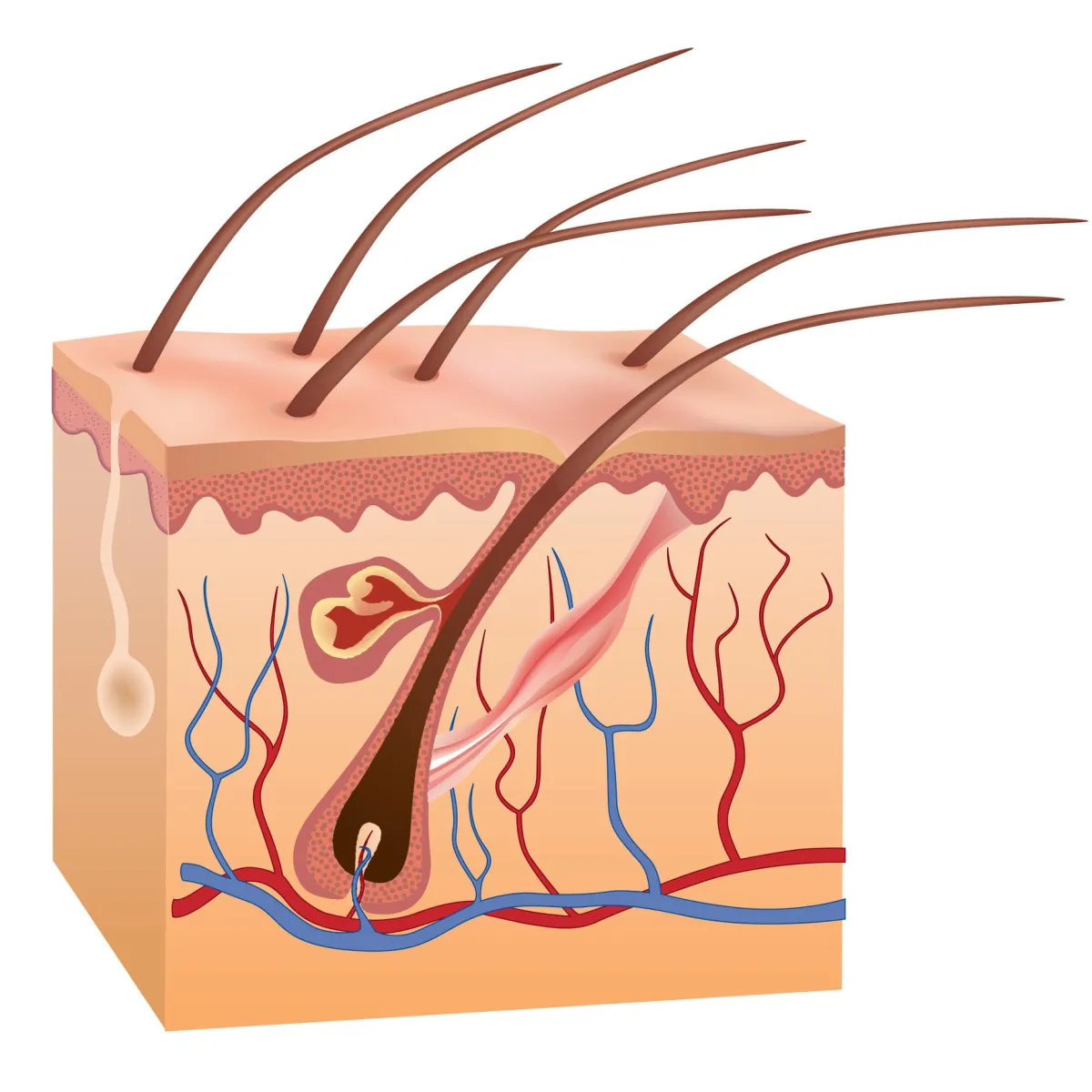
Hormonal Hair Loss FAQ
What causes hormonal hair loss in women?
Hormonal hair loss in women is often linked to imbalances in estrogen, progesterone, and androgens like DHT. These shifts can happen during perimenopause, postpartum, with PCOS, thyroid dysfunction, or even from coming off hormonal birth control. Hair is deeply sensitive to internal change — it's not vanity, it’s biology. When your hormones are off, your hair responds. Period.
What causes hormonal hair loss in men?
For men, it’s usually about DHT (dihydrotestosterone) — a potent form of testosterone. Some men are genetically more sensitive to DHT, which shrinks hair follicles over time. That’s why you’ll hear “male pattern baldness,” but don’t let that phrase minimize it. Hormonal hair loss in men isn’t just cosmetic — it’s cellular, emotional, and often ignored until it’s advanced.
How can I tell if my hair loss is hormonal or something else?
Good question. Hormonal hair loss tends to be gradual, diffuse, or patterned (like temple thinning or widening part lines). It’s often paired with other symptoms: fatigue, mood swings, irregular periods, weight gain, acne, or low libido. If your body's whispering in more than one way — it’s likely hormonal. A trichologist can help you decode the full picture.
Can stress cause hormonal hair loss?
Yes — and it’s not just “stress.” Chronic stress messes with cortisol, which throws off your entire endocrine system (thyroid, adrenals, sex hormones). It can lead to temporary shedding (telogen effluvium) or trigger deeper imbalances that fuel long-term loss. Bottom line: stress doesn’t just “make your hair fall out,” it reroutes your body’s priorities.
Is hormonal hair loss reversible?
In many cases, yes — but only if you address the root cause. You can’t out-supplement or out-shampoo a hormonal imbalance. With the right guidance, testing, and treatment plan, it’s possible to slow or even reverse loss. But patience is key: hair works on a 90+ day cycle. What you see today started months ago.
How long does it take to see results from treatment?
Real talk? At least 3–6 months. Hair regrowth takes time — especially when hormones are involved. Think of it like gardening: you can’t plant seeds and expect blooms the next day. First we stabilize, then we rebuild. What matters is that the change is happening beneath the surface, even if you don’t see it yet.
What treatments actually work for hormonal hair loss?
It depends on the why. For some, it’s correcting nutrient deficiencies and balancing blood sugar. For others, it might mean addressing PCOS, optimizing thyroid function, or reducing DHT sensitivity. Topicals like minoxidil can help — but they’re band-aids unless paired with internal support. Custom plans > cookie-cutter fixes.
Does birth control help or harm hormonal hair loss?
Both. Some pills suppress androgens and reduce shedding temporarily, while others worsen hair loss — especially after stopping them. Think of it like hormonal duct tape: it sticks things down, but doesn’t fix the leak. We’re not anti-birth-control, but we are pro-informed decisions with long-term health in mind.
Why is my hair thinning even though my labs look “normal”?
Ah yes — the classic “you’re fine” even when your hair is saying otherwise. Standard lab ranges are wide, and what’s “normal” isn’t always optimal. Many hormonal imbalances show up in patterns, not single lab values. This is where a trained trichologist can spot what your labs might miss.
Can diet and lifestyle really help hormonal hair loss?
Absolutely. What you eat, how you sleep, how you manage stress — it all speaks hormone. Blood sugar stability, protein intake, mineral levels (think iron, zinc, magnesium), and gut health all play a role in how your hair behaves. Lifestyle isn’t a side note — it’s the foundation.

We’re more than hair. We’re a community, an education platform and a movement.
Our mission is to raise the standard — reigniting the heart of this industry with integrity, purpose, and connection. We’re also committed to bridging the gap between cosmetology, dermatology, and general practice, creating a more collaborative and informed approach to hair and scalp health.
ABOUT
The Hair Wire is a trusted resource created by trichologists, for anyone seeking clarity around hair and scalp health. With clinically backed information, we simplify complex hair loss conditions and offer professional insight, education, and solutions—one strand at a time.
DISCLAIMER
The content on The Hair Wire is intended for educational and informational purposes only. It is not a substitute for medical advice, diagnosis, or treatment. While our material is guided by professional experience and clinical trichology, we encourage individuals to consult with their own healthcare or wellness providers when making personal health decisions. The Hair Wire offers professional insights, not medical directives.
PATRON ACCESS
PRO' ACCESS
© Copyright 2025. The Hair Wire / Facutly of Trichology. All rights reserved.
